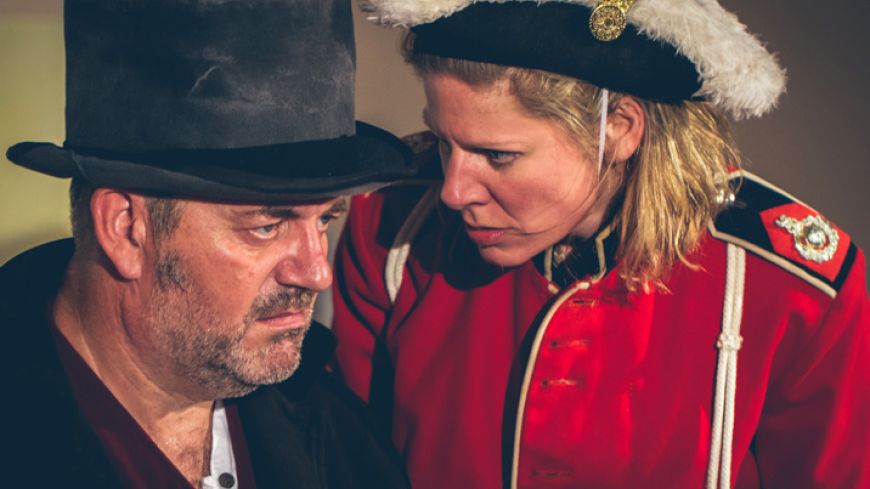
The sumptuous Ballroom of the Assembly Rooms with its extravagant chandeliers may seem like an incongruous place to host a play about the painful birth of trade unionism, but that is just where this world premiere of Neil Gore’s new play We Will Be Free is being held.
Set not so very long ago in 1834, We Will Be Free tells the true story of George and Betsy Loveless. George was a Methodist preacher and leader of the six Dorsetshire farm labourers who were tried, convicted and condemned to seven years transportation in slave conditions for having the temerity to swear a secret oath and form a union to fight against a succession of wage cuts inflicted by the Squire and local landowner.
This two-hander is played out with a simple slotted cardboard set showing the oft referred to symbol of strength, the sycamore tree, and has rapid costume changes to accommodate the variety of characters involved. These are augmented with the relatively modern technology of cartoons on screen to show even more characters. The incongruity of remote controls being zapped from the pockets of breeches was an inadvertent comic feature of the already fairly light-hearted piece about a less than light-hearted subject.
The text is written in inventive rhyme and is punctuated with song, both traditional and bespoke. The cast plays a variety of instruments from accordion, mandolin, fiddle, bodhrán and the Tennessee music box with the beautiful poignant and plaintive sound that comes from its bow at suitable points in the show. All this is under the direction of renowned folk singer and squeeze box player, John Kirkpatrick, of Sultans of Squeeze fame.
The message of the tension and dilemma for Christian Socialists between prayer and action is strong, similar to the more recent Suffrage motto ‘Deeds not Words’, but strongest of all is the message of the fight against injustice.
The play very much holds a moral high ground but felt a bit old-fashioned and didactic. The symbolic slaying of the dragon by St George, as a play within the play by the Casterbridge Mummers at the start, could easily have been cut at no loss to the overriding message of the importance of strength of spirit and the dangers of being trapped in a snare by powers beyond the control of the poor. The modest yet uplifting message at the end from the character Betsy Loveless, ‘I wish you enough’ belied her and her husband’s unfortunate name.
This timeous ballad of betrayal of one class by another is one worthy of reminder.
The play has had the backing of the unions ACCORD, NASUWT, UNITE, SWTUC, SW Unison
Runs 4th– 25th Aug 2013 at 12.30pm (not 12 Aug)
Tickets £15 (£14)
Suitability 12+

